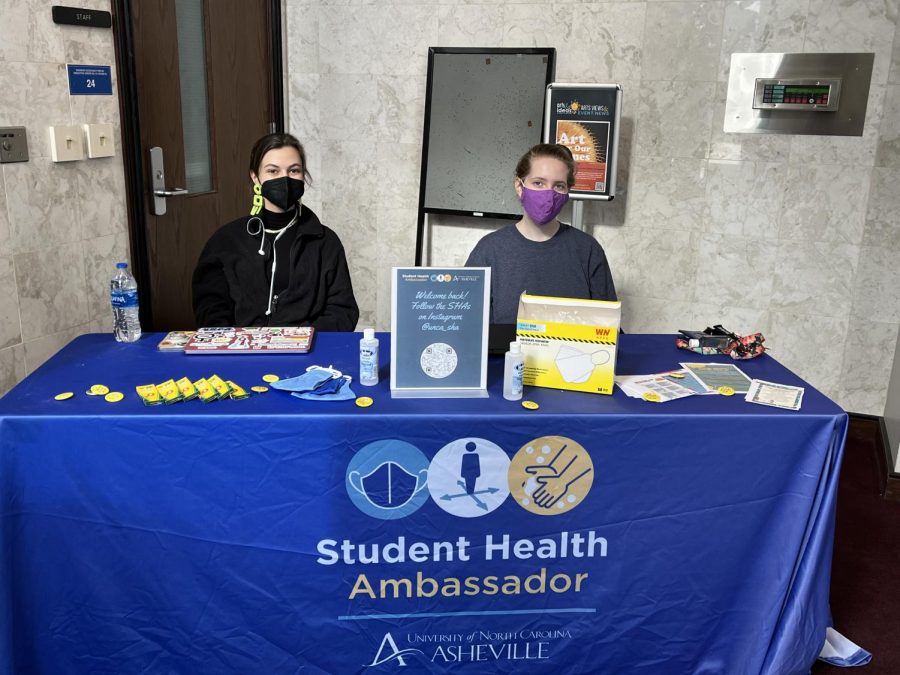COVID resources on campus: what is there to know?
Students Samantha Mazze, left, and Laura Searles sit at a Student Health Ambassador table with COVID resources in Ramsey Library.
February 23, 2022
At UNC Asheville, every year living with COVID brings different changes. Now, most classes remain primarily in person with mask mandates and social distancing guidelines.
How do the people at UNCA protect themselves while living out their best years, being on campus and in person? There are increasingly more COVID-related resources available on campus, though not many know about them.
“There are many visible resources available, including hand-sanitizing stations at building and room entrances, and KN-95 masks and blue surgical masks readily available,” said Sarah Broberg, special assistant to the chancellor for communication and marketing.
Resources can also be found at student health ambassador tables across campus.
Jay Cutspec, director of health and counseling explained one of the primary testing resources on campus, called surveillance testing,
“Surveillance testing is done to assess the prevalence of COVID in the population who are not exhibiting symptoms or who have been exposed to someone with COVID. Surveillance testing is offered seven days a week for students and twice per week for faculty and staff,” Cutspec said.
In emails from UNCA’s Covid Account, surveillance testing is also listed as a resource for students who are unvaccinated.
Third-year student Lucien Grillet said he’s unsure of the commonality of knowledge about COVID resources on campus.
“I usually get tested once a week and I recognize the people who do it, but every time I go there’s only like one other person there getting tested for the hour slot I’m doing,” Grillet said.
While issues remain, Broberg said UNCA continues to make clear efforts regarding the prevalence of COVID.
“The continued commitment to our university culture of care and compassion helped us achieve the lowest prevalence of COVID-19 across the entire UNC System last academic year,” Broberg said.
UNCA’s community vaccine clinic administered over 20,000 doses of the COVID vaccine.
While the vaccine, booster and testing clinics on campus close, testing through the Health and Counseling Center remains available.
According to David Weldon, director of emergency management, this is partially due to a downward trend in people engaging with COVID clinics.
“Our numbers dropped off this past week, so we’re seeing a trend down now with all the home tests that are out. People can get them so readily and do their own self test. Plus, you can go just about anywhere and get a test now,” Weldon said.
Weldon also said in the future, they would reevaluate bringing these clinics back as needed and in accordance with how Buncombe County proceeds.
Guidelines continue to change as the pandemic does. As it stands now, the process includes isolation, definite mask-wearing and communication with the university and close contacts in the case of a positive COVID test.
“Students who test positive will need to isolate for a period of five days and then wear a mask for another five days thereafter. Residential students can isolate at home or in the designated locations on campus. Off-campus students can isolate in their current living space or return home,” Cutspec said.
In addition to providing resources on campus, Grillet said there are resources available off campus, at locations such as Harris Teeter and CVS Pharmacy, which offer supplies like KN-95 masks for free.
As for the results of UNCA’s efforts and resources, Cutspec said it’s been successful.
“Yes, I believe that our COVID plan has been extremely effective in controlling the spread of COVID. This is evidenced by the fact that the incidents per 1000 students for our campus is relatively low as compared to other UNC campuses,” Cutspec said.


















